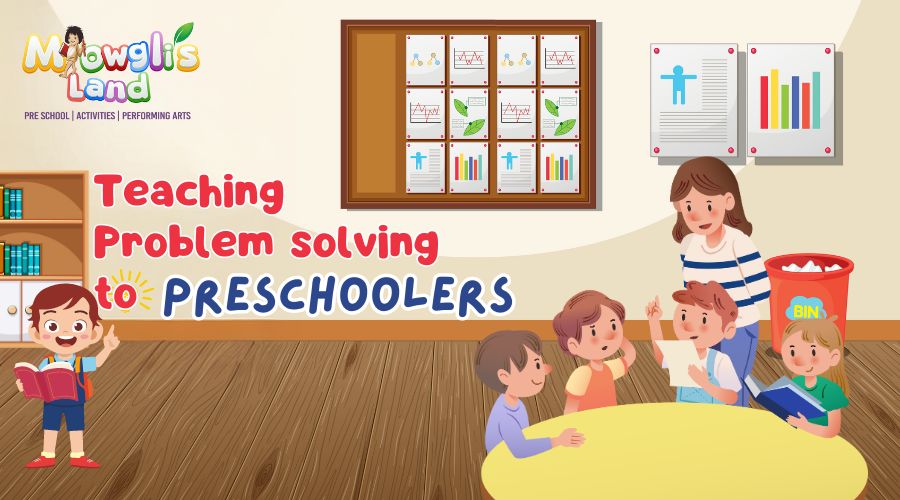Problem-solving is crucial for a child’s cognitive development and future success. Teaching preschoolers to tackle challenges and think critically can be fun and educational. As parents and teachers, one must ensure that their little ones can have the skill of problem-solving, as it helps in the long run.
This blog will share some effective strategies for fostering problem-solving skills in young children at the best preschool near me.
1. Encourage Curiosity and Questions
Preschoolers are naturally curious. Encourage them to ask more and more questions and explore their surroundings. When they ask, “Why?” or “How?” take the opportunity to help them and engage with them in finding the answers. This nurtures their curious nature and allows them to solve problems.
2. Use Everyday Situations
Everyday moments are perfect opportunities for teaching problem-solving to toddlers. Simple activities like figuring out how to fit different shapes into a puzzle, deciding what to wear based on the weather, or organizing their toys can help early learners develop problem-solving abilities. This includes simple daily activities.
3. Show Problem-Solving Methods
As we know, kids learn a lot by observing adults. When you face a problem, verbalize your thought process. For example, if you’re fixing something around the house, talk about the possible steps you’re taking to solve the issue. This develops a desire to be independent and solve even complex problems themselves.
4. Encourage Open-Ended Play
Open-ended play with blocks, random toys, or art supplies allows children to create and solve their problems. They learn to explore, make decisions, and discover solutions accordingly. Such activities boost creativity and critical thinking in kids. Moreover, in open-ended games, there is no boundation regarding winning or losing; your little one can freely play without fearing losing.
5. Introduce Problem-Solving Games
For preschoolers, simple games and activities can enhance their problem-solving skills. Puzzles, matching games, and simple board games like Snakes & Ladders and chess teach children to think ahead, make choices, and see the consequences of their actions. This greatly results in preparing strategies and improves their overall problem-solving skills.
6. Foster a Growth Mindset
Developing a growth mindset in your little one is a crucial aspect, as it helps them in the long run. Teach children that it’s okay if they make mistakes, as they can learn from them. Praise their efforts and consistency rather than just focusing on the outcome. This helps them develop a positive attitude towards challenges.
Also read: 5 Tips to Boost Parent-Teacher Collaboration
7. Encourage Teamwork Collaboration
Encouraging your kid to participate in group activities can teach them the value of teamwork. Activities where children work together to solve a problem highly benefit their communication skills, sharing ideas, and listening to others. Working in a team helps with building trust and interpersonal communication.
8. Ask Open-Ended Questions
When a child faces a challenge, ask them open-ended questions like, “What do you think we should do next?” or “How can we solve this problem?” This encourages them to think and come up with solutions rather than being dependent on others. Moreover, kids should be given freedom up to some extent so that they can self-reflect and find answers to their queries.
9. Read Problem-Solving Stories
Oftentimes, children follow and mimic the habits of their favorite cartoon or book story characters, so for that, choose content that features characters that solve problems. Discuss the story and ask questions about the characters’ decisions and actions. This can help children understand different approaches to problem-solving and apply them in real life.
10. Provide Positive Feedback
Recognize and celebrate when children solve problems, no matter how small. Positive reinforcement builds their confidence and motivates them to tackle new challenges. Provide your kids with positive feedback so that they can experience enhanced productivity, encourage efforts, and build confidence.
Conclusion
Teaching problem-solving to preschoolers is about creating an environment that encourages curiosity, experimentation, and growth. By integrating these strategies into their daily routines with us at Mowgli’s Land, young children can be helped to develop essential problem-solving skills that will benefit them throughout their lives. Simple tasks like puzzles, building blocks, and interactive games encourage children.
It’s important to provide guidance and support while allowing them the freedom to explore and learn from their mistakes!




